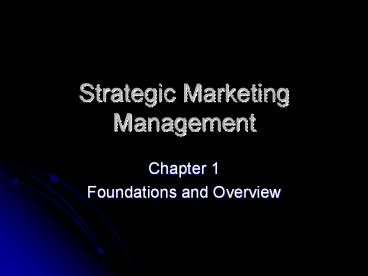Strategic Marketing Management - PowerPoint PPT Presentation
Title:
Strategic Marketing Management
Description:
Strategic Marketing Management Chapter 1 Foundations and Overview – PowerPoint PPT presentation
Number of Views:1496
Avg rating:3.0/5.0
Title: Strategic Marketing Management
1
Strategic Marketing Management
- Chapter 1
- Foundations and Overview
2
Defining the Organizations Business, Mission,
and Goals
- The practice of strategic marketing management
begins with a clearly stated business definition,
mission statement, and goals/objectives to
fulfill the mission - A business definition outlines the scope of a
particular organizations operations - The mission statement defines the organizations
purpose. - Goals/objectives specify what an organization
intends to achieve. - What business are we in? What basic consumer
needs/wants do we fulfill?
3
ExampleThe Hallmark Company
- What needs/wants do they fulfill?
- Generic versus product markets
- The search for growth opportunities
- Greeting cards versus the personal expression
market.
4
Business Mission
- An organizations business mission complements
its business definition. - It reflects managements vision of what the
organization seeks to do. - Some are general statements, others may be very
specific. - Clearly stated mission statements add focus to
the organizations efforts.
5
ExampleThe Saturn CorporationsMission
Statement
- Market vehicles developed and manufactured in
the United States that are world leaders in
quality, cost, and customer satisfaction through
the integration of people, technology, and
business systems and to transfer knowledge,
technology, and experience throughout General
Motors
6
Business Goals
- Goals/objectives convert the organizations
mission into tangible actions that are to be
achieved within a specific time frame. - Includes production, financial, and marketing
goals.
7
Examples of Business Goals
- Achieve a 10 annual growth rate in sales.
- Introduce new products at the rate of 3 per year.
- Pursue only new product ventures that will have a
payback period of 5 years or less. - Engage in research and development that
complements existing product lines.
8
Identifying Growth Opportunities
- Environmental (market) opportunitiesboundless.
Which are opportunities for us? - What are our distinctive competencies as an
organization? - What are the success requirements in the market
under consideration? - A matching process
9
SWOT Analysis
- Formal framework for identifying growth
opportunities. - Helps focus the matching process.
- Goes beyond just developing lists.
10
Examples of Strengths
- Reputation/brand image
- Distribution channels
- Research and development skills
- Experienced management talent
- Experienced sales force
- Note that all of the above are sustainable
strengths.
11
Examples of Weaknesses
- Includes the lack of the previous
- High debt
- Lack of manufacturing capacity/capability
12
Examples of Opportunities
- Upturn in consumer confidence
- Trends in consumer needs/wants
- Demographic trends
- Changes in distribution patterns/consumer
shopping behavior
13
Formulating Product/Market Strategies
- MARKETS
- Existing
New Existing Market
penetration Market development
- OFFERINGS
- New New offering development
Diversification
14
Selecting Product/Market Strategies
- Is the strategy consistent with organization
mission, goal, and capabilities. - What are the costs and benefits of alternative
strategies and their probabilities of success? - Includes an analysis of competitive structure,
market growth or decline factors, and opportunity
costs.
15
Developing Product/Market Strategies
- Selecting Target Markets
- Determining the Marketing Mix
- Product/Service
- Price
- Promotion/Communication
- Place/Distribution
16
Budgeting for the Strategy
- Formal, quantitative expression of the
organizations plan in financial terms. What will
it cost??? - Important so that organization goals are
attained.
17
Developing Reformulation and Recovery Strategies
- Plans seldom go exactly as expected since they
are based on assumptions regarding consumer
response, competitive reaction, and environmental
factors. - Important to periodically conduct marketing
audits to determine problem areas. - Preplanning of reformulation/recovery strategies
allows faster response times in determining
remedial action (contingency plans).































